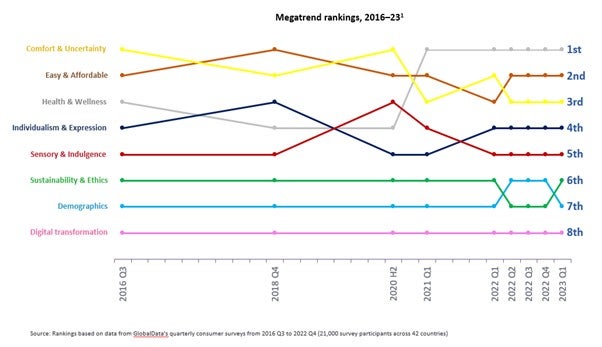
Since the pandemic, health and wellness have jumped up the consumer agenda for all demographics.
GlobalData 2023 research shows that consumers today are now much more conscious of their physical health and mental wellbeing and will choose what to consume with increased attentiveness towards ingredients.
Analysing health information and ingredients on product labelling has been normalised, and consumers generally have a good understanding of the impact of ingredients on their health and wellbeing. This is the conclusion of the authors of the GlobalData TrendSights Analysis 2023: Catering to Shifting Consumer Perceptions and Habits Regarding Physical Fitness and Mental Wellbeing report, which says that grocery shoppers “will proactively make lifestyle choices and purchase decisions to maintain wellbeing.”
GlobalData uses the results of a quarterly consumer survey of 21,000 people above the age of 16-years-old in 42 countries to understand key purchasing habits and priorities. These are then organised into a megatrend hierarchy. The illustration below shows that of the eight megatrends defined by GlobalData as having the biggest impact on the consumer agenda, health and wellness has taken the top spot since 2021, ahead of Easy and Affordable and Comfort and Uncertainty.
GlobalData analysts say the growing prevalence of obesity and chronic health disorders, like diabetes, cancers, autoimmune conditions, heart disease, dementia and even allergies have led to growing media emphasise and focus on prevention and mitigation through changes to lifestyle and most importantly, diet – a key aspect that wasn’t really considered just a few years ago.
Social media influencers advocating health hacks are also contributing to raised awareness of the long-term benefits of protecting immunity and boosting what scientists call gut-brain health, with various approaches, including regular consumption of certain functional vitamins, minerals and other key ingredients, such as certain strains of probiotics.

Why we all need to pay attention to the microbiome
As health and wellness become a hot topic, there is growing focus on scientific studies that show that within the complex set of tissues and organs that make up our digestive tract – our gut – there is an ecosystem made up of trillions of microorganisms that play an outsize role in influencing whether we remain fit and healthy into old age or not. This vast community of microorganisms, or microbes, is made up largely of bacteria, yeast, fungi and viruses and together is known as the microbiota.
“Any disturbances in the composition of the microbiota and its functionality may predispose some health disorders such as metabolic syndrome, colorectal cancer, obesity, diabetes, and allergies,” says Chyn Boon Wong, PhD, assistant manager, marketing and scientific affairs, Morinaga Milk. Scientific studies have found that altered gut microbiota occurs in most obese individuals and that it may contribute to the onset of chronic low-grade inflammatory processes.
Dr Wong, who is responsible for the translation of scientific research in probiotics strains into business innovation for the company, adds: “On a day-to-day basis, our diet and lifestyle are, without a doubt, influencing our microbial companions. In this regard, supplementation of probiotics – live microbes that, when consumed in adequate amount, confer a health benefit on the host, is drawing attention.”
Morinaga Milk is a milk and dairy company based in Japan but is also a pioneer in bifidobacteria research and the role of Human-Residential Bifidobacteria (HRB) in influencing and maintaining human health. The company was founded in 1917. Inspired by the fact that bifidobacteria are the predominant group of bacteria residing in the intestines of breastfed infants – and so the first colonisers of the human intestine – the Tokyo-based firm has developed a portfolio of science-backed HRB probiotic strains.
It hopes these will resonate with international food companies looking to cater for a growing cohort of clued-up customers.
“There is a good reason why certain HRB strains are found in the gut of infants and that’s because they are compatible with and can optimise the characteristics of human breast milk for maximum health impact. Their prevalence in the human gut is of substantial importance to human health across the lifespan and play essential roles in regulating intestinal, immunological, and metabolic systems.
These include the production of short-chain fatty acids and vitamins, immune system development, and maintenance of gut stability. But the presence of certain HRB species naturally decreases in older adults.” Dr Wong says. “That’s why we have developed key representative HRB strains as probiotic ingredients, each with its specific clinical efficacy.”
Morinaga Milk research findings show that certain HRB species are particularly effective at producing beneficial metabolites, small molecules formed during the digestive process. One of these is folate – an essential vitamin for cell growth and digestion. Folate deficiency is associated with neural tube defects, megaloblastic anaemia, and cardiovascular disease.
Dr Wong is keen that consumers understand that – as they embark on their quest for health – not all functional food ingredients, which are those that claim to have health and wellness benefits, will deliver on all of the desired effects and that is very much the case with probiotics.
As shoppers look for the “organic” or “free from” labels when it comes to food and groceries, she says consumers will become even more discerning when it comes to food ingredients like probiotics, which have been liberally used as a health tool by food companies for years. “Probiotics are not all made equal and multiple studies show that certain HRB strains are better probiotics for human consumption,” Dr Wong says. “As the health market gets bigger and more regulated, it becomes even more important for food companies to partner with ingredient companies that are guided by science and really know their market.”



